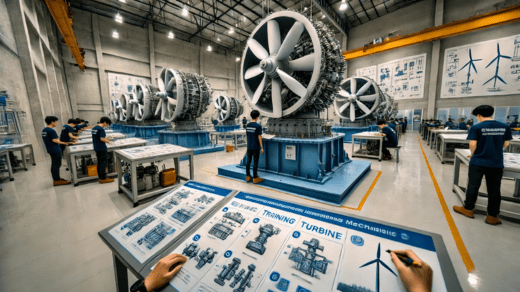In modern industries, efficiency, reliability, and sustainability depend on well-engineered systems such as water turbines, turbine service units, fans, and compressors. These components are vital in energy generation, manufacturing processes, and industrial operations. The demand for skilled professionals to operate and maintain these systems has also led to the emergence of specialized training programs. This article explores the importance of these technologies and the role of training in enhancing their performance.
Water Turbines: A Sustainable Energy Solution
A water turbine is a key component of hydroelectric power generation, converting the energy of flowing or falling water into mechanical energy and then into electricity. They are widely used in renewable energy projects, contributing to global efforts to reduce reliance on fossil fuels.
There are several types of Water turbine, including Pelton, Francis, and Kaplan turbines, each designed for specific conditions like water flow and pressure. Their efficiency and adaptability make them essential for harnessing renewable energy sources. However, to maintain optimal performance, water turbines require regular inspections and precise adjustments, making proper maintenance a crucial aspect of their operation.
Turbine Service Units: Ensuring Longevity and Efficiency
A turbine service unit plays a critical role in maintaining and enhancing the performance of turbines. These units are equipped with advanced tools and technology to diagnose problems, perform repairs, and optimize turbine functionality.
Service units can address issues like wear on turbine blades, misalignment of shafts, and reduced efficiency due to environmental factors. Regular servicing not only prevents costly downtimes but also extends the life of the equipment, ensuring industries meet their productivity and sustainability goals.
Fans and Compressors: The Backbone of Industrial Systems
Fans and compressors are indispensable in industrial operations, supporting processes such as ventilation, cooling, and gas compression. Fans are primarily used to move air or gases in systems like HVAC, exhaust setups, and industrial cooling mechanisms. Compressors, on the other hand, increase gas pressure for applications such as refrigeration, energy storage, and pneumatic tools.
Both fans and compressors require regular maintenance to ensure peak performance. Neglecting their upkeep can lead to inefficiencies, increased energy consumption, and potential system failures. By implementing routine inspections and adhering to maintenance schedules, industries can extend the life of these systems and maintain operational stability.
Training Turbines: Developing Expertise in a Changing Industry
The advancement of turbine technology has highlighted the need for ttraining turbines, a key component in workforce development. Training programs are designed to prepare technicians and engineers to handle complex turbine systems efficiently and safely.
These programs often include hands-on training with real turbines or simulators, covering areas such as system design, operational protocols, troubleshooting, and maintenance techniques. By equipping personnel with practical knowledge, industries can minimize operational errors, improve safety, and optimize performance. As the renewable energy sector continues to expand, the demand for trained professionals in turbine operations is expected to grow significantly.
Conclusion
Water turbines, turbine service units, fans, and compressors are foundational technologies in energy production and industrial processes. Their proper maintenance and operation are vital to achieving efficiency and sustainability. Furthermore, training turbines and other specialized programs ensure that industries are equipped with skilled professionals capable of meeting future challenges. By investing in these systems and workforce development, industries can drive innovation, enhance productivity, and contribute to a more sustainable future.

